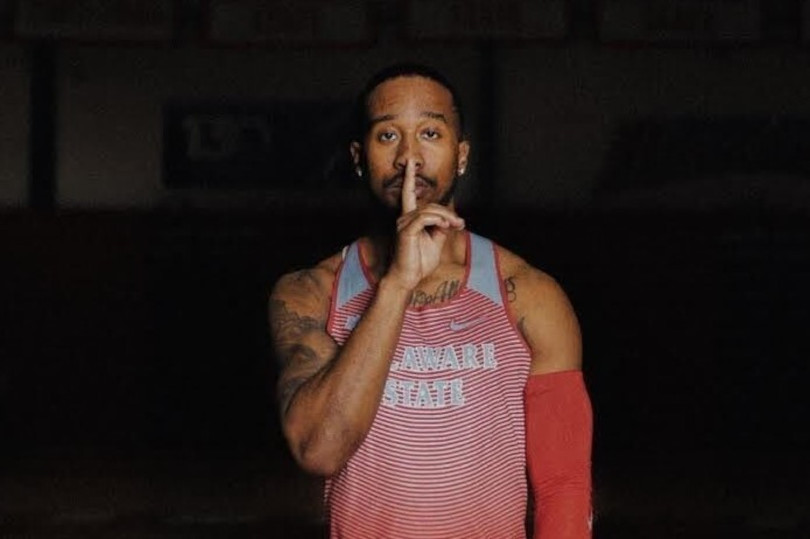The official NCAA website states, “nearly eight million students currently participate in high school athletics in the United States,” with over 480,000 competing as NCAA athletes, “and just a select few within each sport,” moving on to compete at higher levels such as professional or Olympic. This means the odds of playing at the colligate and/or professional level are slim to none for most high school athletes.
I reached out to Andre Carr on Instagram where he often posts videos of his work outs and offers training sessions to athletes of all levels and backgrounds. Carr has grown into his own both athletically and professionally, which is why I spoke with him about his personal career running track at the colligate level and how that has transitioned into his professional career being a personal trainer. I asked Carr how he first got into sports and the motivation that pushed him to go beyond just the high school level. “My athletic career started at a very young age, about six or seven when I started playing football,” he said. “Always knew I was athletic and gifted just from playing childhood games like freeze tag,” Carr said.
The Study of Movement
Like other aspiring athletes, Carr saw playing at the next level as a steppingstone to help pay for school, while also continuing both his academic and athletic endeavors. When I asked Carr if there were any hardships or setbacks on his path to success he said, “not until my senior year when I tore my ACL.” However, Carr used his unfortunate injury to further inspire him towards studying kinesiology – the study of movement. “I kind of learned from it,” he said. “I was my own patient and began doing research on muscles; that’s how I fell in love with learning about the muscles of the body and got myself back through my own research.” Noting he had a doctor of course, but he worked hard, which resulted in him coming back from an ACL tear in six-months.
Carr’s hard work coming back from an ACL injury paid off. He attended IUP (Indiana University of Pennsylvania) and then transferred to Delaware State University where he finished his colligate career. Both experiences gave him an opportunity to network and push himself to be better. When I asked about his career accolades, Carr mentioned events such as the 60-, 100-, and 200-meter sprint, while also contributing to the 4×1 relays. “10.44 in the 100, in the 60 my personal record was 6.71. The 200 got kind of rough in college, but I was still running a 21.90.” Even with success running track at the colligate level, Carr was realistic with the difference in playing after high school. I asked him what he had to do differently at the colligate level, compared to when he ran in high school. “The work you put in at practice, it’s not an overnight thing,” Carr said. “You might have a good week of practice and come out at the track meet with it not being your day.”
Personal progression in sports always changes as you move to the next level. There are going to be times where your performance isn’t up to the standards you desire, and discouragement might creep into your mind. Carr makes it clear that “not every day is going to be your greatest day,” and that with growth you’re going to have to adjust to circumstances you may not be used to. “You have to roll with it and stay focused on the goals…be prepared for anything,” Carr said.
Performance Instruction
Using what he’s been through both academically and athletically, Carr began a journey sometime last year as performance instructor for Coppermine. “It was God’s timing,” Carr said, acknowledging the opportunities he received because of his prior trainings and connections with his Coach. He used that to propel him to his next phase in life. I asked Carr what goes into structuring his workouts and how he goes about getting the best results for his clientele. “Workouts are structured for all levels,” Carr said. “We start off with very simple plyos (short, intense bursts of activity) and movement, so that over time, once the athlete gets mastery over the movement, we just add to it and make it complex.” Ensuring that whenever someone comes—no matter what level—they can progress at their own pace. Having just started, Carr himself is also learning from those he teaches, to hone his own craft and develop as a trainer.
Through his own personal experience, Carr offered advice for young athletes pursing their own goals at the next level. “Focus on the fundamentals,” Carr said. “The fundamentals and technique of whatever sport you’re playing will take you way further than just pure talent.” Carr also offered advice for those looking to coach. “Just go for it. I wouldn’t say that it’s easy or that it’s too hard, but you have to go for it and put yourself out there.” Just like anything else in life, you must step outside your comfort zone, or risk the possibility of missing opportunities that may come your way.
You can find Andre Carr on Instagram @Drethedash or email coachdre5@outlook.com for training inquires.
Article featured image courtesy of Andre Carr.


